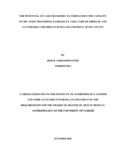| dc.description.abstract | This study investigated the potential of cash transfers to strengthen the capacity of HIV affected fishing families to take care of orphans and vulnerable children in Budalangi District, Busia County. The study examined fishing as a means of livelihood for families affected by HIV/AIDS, the indirect effect of cash transfers on fishing as a means of livelihood for families affected by HIV/AIDS and the use and effect of cash transfers on the lives of OVC and their families. The study sample included beneficiaries of OVC- CT, non- beneficiaries of OVC- CT, OVC, implementers and knowledgeable stakeholders in the issues of OVC- CT.
The study used exploratory ethnographic design and resilience theory to explain the relationships between variables. The data collection methods included in- depth interviews, focus group discussions, key informant interviews and structured observations. Qualitative data was presented descriptively according to the emerging themes using illustrations from the transcripts. Descriptive analysis, including frequencies, percentages and tables were used to describe the basic demographic characteristics of the sample population.
The findings indicate the potential of OVC-CT to strengthen the capacity of HIV affected fishing families to take care of orphans and vulnerable children in Budalangi. The dynamics of fishing as a means of livelihood in Budalangi in the era of HIV/AIDS, presents a lot of vulnerabilities for orphans in the region. OVC-CT offers an alternative source of
income for the OVC beneficiaries and shields them from vulnerabilities such as paid labour and transactional sex.
The study also found that OVC-CT also had indirect effects on fishing families affected by HIV/AIDS. Beneficiaries for instance have used the funds to buy fishing equipment and also as capital for fish trade. This has in turn improved household income, led to better living conditions and enabled households to bounce back to normal functioning.
The uses and effects of OVC-CT among fishing families affected by HIV/AIDS also demonstrates the potential of OVC-CT in strengthening the capacity of HIV affected fishing families. The study recorded the uses of OVC-CT in taking care of basic needs and the effects both positive and negative within the family and community setting.
It is concluded that OVC-CT has the potential of strengthening the capacity of HIV affected fishing families to take care of orphans and vulnerable children in Budalangi District, Busia County. OVC-CT has exposed beneficiaries to regular and consistent income. The orphans in HIV affected fishing families are now able to access education, health care and improved quality of life through access of basic necessities. The findings also show that OVC-CT has helped to reduce instances of paid labour and transactional sex for the beneficiaries.
Overall, OVC-CT has enabled HIV affected fishing families in Budalangi to rebuild their means of livelihood through investment in fishing livelihoods and enabling the fishing families affected by HIV to be resilient and bounce back to normal functioning. | en_US |

